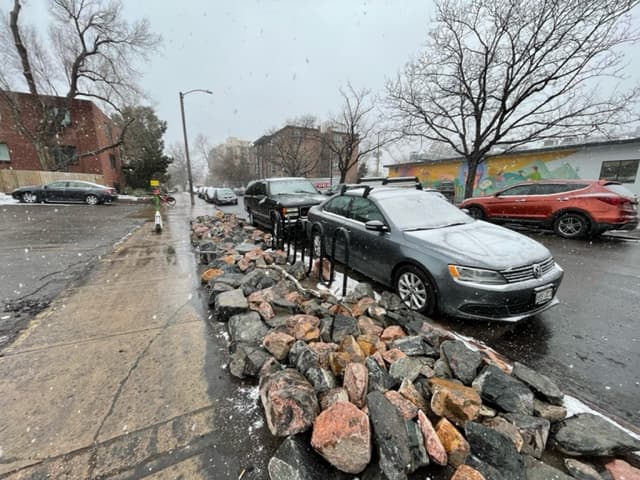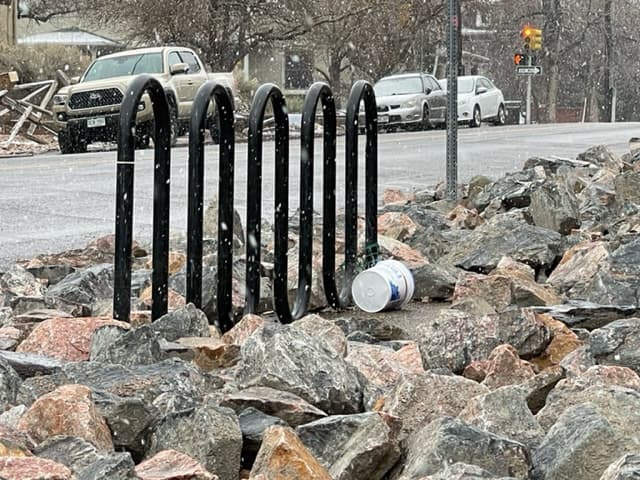On Monday morning, Mike stood under an awning next to Sexy Pizza and 7-11 in Cap Hill. He was watching the snow. A bandana covered his face, a cap protected his ears, and he was bundled in a coat. Two years ago, he lost his job as a roofer. Now his possessions are stored in a tarp-covered cart.
Later in the day, when he inevitably would be kicked out from under the awning, he didn't know where he would go to warm up and dry out. For now, he stood and stared.
His vista: jagged rocks covering the public right of way and blocking bike racks where a few weeks ago unhoused people camped at 11th Avenue and Ogden Street. To him, the littered rock garden showed that housed neighbors didn't want unhoused people to exist in Capitol Hill.
"They hate us," he said.
Mike declined to share his last name or be photographed. He feared residents would identify him. They have been harassing unhoused people, messing with their belongings, calling the police and even dumping trash and starting fires at encampments, he said.
People laid down the rocks "to keep us, the homeless, from being able to set up," Mike said. "They'd rather spend the money to do this than to help someone, to actually do something."
Activists are clashing over where unhoused people should stay across the city.
Groups like Citizens for a Safe and Clean Denver are trying to stop people from sleeping on the streets.
"We are no longer going to watch the decline of Denver," the group declared online. "Instead, we are going to end urban camping and stop the exponential increase in crime, trash, violence, public defecation and open drug use in our city."
Since Denver doesn't sweep people as quickly as the activists would like, the group encourages residents and property owners to put up temporary fencing to block sidewalks. Citizens for Safe and Clean Denver also advocate against harm reduction and Safe Outdoor Spaces, the city-funded heated tents around town.
"Stop mollycoddling the service resistant/hostile unsheltered addicts and mentally ill," the organization wrote in its 14-point platform.
Mike's take: Groups like Citizens for a Safe and Clean Denver are getting it wrong by depicting people living on the streets as criminals who refuse city services.
"Most of us don't follow the stereotype of some dumb junkie who just wants to be homeless," he said. "That's not true at all. And there's not as much help as everybody tells you there is for us. There's really not much at all. I mean, it's harder to get help than it is to just do your own thing and try to take care of yourself out here."
Ana Cornelius, an organizer with the advocacy group Denver Homeless Out Loud, lives a few blocks from 11th and Ogden.
"I hate the rocks everywhere," she said of the landscaping designed to deter unhoused people from camping. "They're really difficult to navigate."
She worries about children and elders getting out of cars and tripping, trash stuck between the rocks; and rats, who have made house in rock gardens.
Some of her fears were already coming true Monday morning. Litter had blown its way into the rocks, and despite heavy winds, it wasn't going anywhere. Nobody from the building was picking it up.
"We want to have a city that's inclusive and walkable, and that we can all enjoy," Cornelius said. "And a lot of these features prohibit that and really make our city pretty ugly."
She is concerned that landscaping designed to stop people from camping -- from fencing to rocks -- has been installed without required city permission. She's part of a group of residents that have been monitoring unpermitted fencing in Capitol Hill and complaining to the Department of Transportation and Infrastructure.
"It's really a land grab that is occurring with no process and no one even blinking at it," she said. "And I think that degrades our democracy. And I think that should be an area of concern for all citizens."
DOTI spokesperson Nancy Kuhn noted the bike racks blocked by the rocks were not installed by the city and the agency did not issue a permit for them.
"Regarding landscaping/rocks in the tree lawn area, primary considerations for DOTI are whether the rocks create a significant safety issue such as sight distance problems at corners or whether the rocks block people from using the street or sidewalk," she added. "We encourage people who are thinking about putting things in the tree lawn to reach out to our team via 311 to see if a permit is required."
When it comes to urban camping, Cornelius wishes the city provided spaces for every unhoused person to live. But that isn't happening, she said, disputing the Department of Housing and Stability's claims that there are enough beds in shelters for every person living on the streets.
"We don't have enough spaces for all of the people that are out there -- not in what is appropriate for them," she said, pointing to couples who could not stay together in shelters, wheelchair users and people with animals.
When the city claims people living on the streets are "service resistant," she said, they're only resisting services that aren't appropriate for them. As a former unhoused person, she was always service resistant because what was available didn't work for her situation. And just because people don't accept services that aren't relevant for their situation doesn't mean unhoused people aren't contributing to the city, she said. She earned a bachelor's, went to graduate school and worked in homelessness services while she was unhoused.
She likened the city saying it has enough beds in the shelters for every person on the streets to a person saying they have enough shoes for everybody -- only the people needing shoes wear size 11 and the shoes that are available are size 6.
"If you are really committed to reducing those numbers [of people sleeping outside], then you have to actually provide the resource that is suited to their needs," Cornelius said. "Because putting in a resource that's not suited to their needs does not alleviate the situation."

Landscape designer and biking advocate Ann Nguyen, who sits on the Respect, Inclusion, Diversity, Equity Advisory Board of Bicycle Colorado, was stunned when she first saw photos of the rocks surrounding the bike racks.
"It's going to twist your ankle. That's terrible," she said, later adding, "It's a dangerous solution for people driving, people cycling and people walking,"
She also worries that such rock clusters trap trash. And she said the rock garden won't deter people from camping in the area, which is what it was designed to do, since there is so much concrete space around them where someone could set up a tent.
"It's just not a thoughtful solution for the greater community," Nguyen said.
Jack Todd of Bicycle Colorado, said the bike racks at 11th and Ogden aren't in a good place -- and not just because of the rock garden.
"I think that whoever put that bike rack there doesn't actually put much consideration into the bicyclists they're trying to serve," he said. "That's not a functional place to park a bike when your options are a rock garden or putting the wheel out in front of a car."
It's not the first time he's been frustrated by where racks are located -- though it's the first time he's seen landscaping designed to keep out unhoused people interfere with bike parking.
"It's just unfortunate that the most vulnerable users of our streets are being pushed aside like this," he said. "And I mean that both in terms of unhoused individuals, but also vulnerable road users like bicyclists who need safe places to park. It's sad."
Correction: The story has been updated to clarify Cornelius's experience with rats and education.













